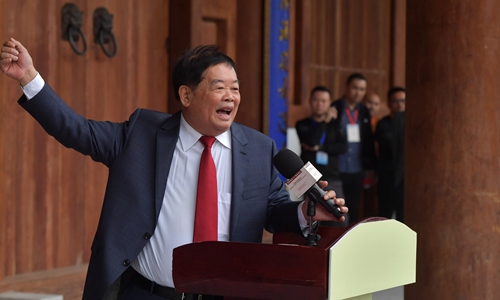HOME >> SOURCE
American Factory’s Oscar success story
By Li Xiaohong Source:Global Times Published: 2020/2/11 10:59:47
How China’s Fuyao Glass overcame cultural differences to thrive

Cao Dewang, chairman of Fuyao Glass Photo: VCG
American Factory won the Oscar for Best Documentary Feature on Sunday. It tells the story of the launch and operation of Chinese company Fuyao Glass in Moraine, the US, reflecting on the economic mire in the rust belt region as well as the cultural gap between China and the US. The Global Times interviewed Cao Dewang, chairman of Fuyao Glass, about the story behind the documentary.
Transparency on camera
"When we agreed to make a documentary about our US factory, few companies wanted to do such a thing as the US film production team asked us to disclose everything," Cao told the Global Times on Monday.
"The filmmaker said the documentary couldn't be randomly edited and that it was up to him to decide what content was released. I told him he could show anything he shot at our factory," Cao said.
"'Don't spoof me,' I said to them. Hearing this, they all laughed, telling me to trust that they wouldn't do that," he said.
Cao admitted that while his company has good things to show, improvement is needed in some aspects too. For example, taking attendance in the morning at the factory in Fuqing, East China's Fujian Province, was previously an issue.
"I have no idea when the movie production team shot the video about us taking attendance at that factory. We did indeed have that rule then, but it has now been removed," Cao said.
The factory manager used to hold a meeting with all workshop leaders every morning, telling them their work for that day and other requirements as the factory may manufacture glass for German automobiles one day and US automobiles another. Thus the requirements needed to be clarified, Cao said, noting that the rule also made sure the workshop leaders had entered work mode.
"But during shooting, our employees said, 'One, Two, Three, Four,' giving a sense of militarized management," Cao said. "At the end of August, the director showed me the movie sample and asked me for advice. I said it was okay and the content they had shot in accordance with our agreement could be released," he said.
"From shooting the documentary to managing the US factory, I came to realize that the biggest problem between China and the US is that communication is insufficient and the two don't know much about each other," Cao said.
Americans are straightforward and pursue transparency to guarantee fairness and equality, and Chinese companies have to become accustomed to that, he said.
Cao said Chinese companies operating in the US should not cover up faults and consider themselves smarter than local firms.
"For example, when we implement projects in the US, I tell our US employees what we will do for this step and the next step. For targets that we can't achieve, I tell them the obstacles. And I ask for some more time to [solve problems] and act according to the plan," he said.
Conflicts brought about by cultural differences
In the documentary, it is clear that Chinese workers believe their American colleagues are slow workers, while American employees complain about the strict discipline and boring work of Chinese firms. It shows the differences in the workers' demands, and the difficulties of the business management model.
Such contradictions among different cultural backgrounds are gradually merging alongside the development of the factory. "In the early days, only older workers were willing to come to our factories; New talent would not go to small factories like ours," Cao said.
He said that with the improvement of Fuyao's local reputation and welfare benefits, the number of young college graduates at the factory gradually increased in the second half of 2018, and now accounts for almost half of the workforce.
They are attracted not only by clean, attractive and highly automated factories, but also by a strong sense of honor, he noted.
"I often tell our American workers that they come here not only for a job, but also to work for the industrial safety of their country," Cao said.
He explained that a car cannot be shipped without glass, and that a 12-hour time difference between the Eastern and Western hemispheres could cause supply problems. But the establishment of Fuyao's US factory solved that problem and ensured the supply chain for the automotive industry.
"Once these high-caliber US workers figure out what I want to do and how I will do it, they can get started faster than our Chinese workers." Cao said his US factory began to turn a profit in 2017, and profits have increased yearly since. Annual profits in 2019 reached millions of dollars.
Fuyao's US factory is also catching up with US standards in corporate management and culture. "We've set up an employee compensation and benefits advisory committee, which aims to let employees offer their opinions so we can do better, so as to strengthen the communication between employees and management. In addition, we have a factory open day every week, when residents can come to visit our factories. They are also welcome to send their children over," said Cao.
"The Chinese and the US economies are highly complementary. For each, the other is the most advantageous economic and trade partner in the world. Deepening China-US economic and trade cooperation is of great significance to the development of the two countries and the prosperity of the world," Cao said.
Cao further noted that though the Chinese economy is temporarily affected by novel coronavirus pneumonia, it is inherently resilient and there is room for recovery. He said the country's long-term positive trend will not change. It can still provide a broad market and solid support for the global economy.
Posted in: COMPANIES